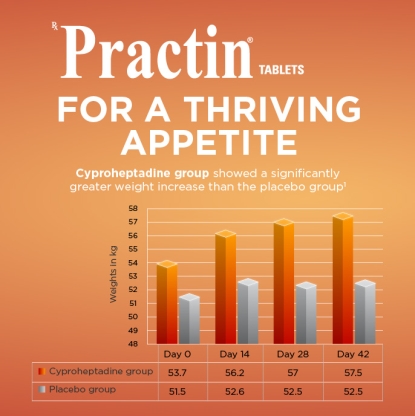Power Up The Potential:
Clinically Proven to Deliver Muscle and Weight Growth
Editor's Pick
Q1: What is cyproheptadine and its role as an appetite stimulant?
A: Cyproheptadine is an antihistamine used off-label to stimulate appetite in individuals experiencing weight loss due to illness.
Q2: What patient populations might benefit from cyproheptadine as an appetite stimulant?
A: It is often prescribed for individuals with chronic illnesses, and patients experiencing anorexia due to medical conditions or treatments.
Q3: How does cyproheptadine stimulate appetite?
A: Cyproheptadine may stimulate appetite by blocking serotonin receptors in the brain, potentially leading to increased food intake.
Q4: What is the recommended dosing for appetite stimulation?
A: You should start with 4 mg three times a day and taper down to 4 mg twice a day or once a day based on the patient's response. Please ensure
that the total daily dosage does not exceed 20 mg.
Q5: What are the potential side effects of using cyproheptadine for appetite stimulation?
A: Common side effects include drowsiness, dry mouth, dizziness, and increased appetite, which may be beneficial in this context.
Q6: Are there any contraindications for using cyproheptadine as an appetite stimulant?
A: Contraindications include hypersensitivity to cyproheptadine, narrow-angle glaucoma, urinary retention, and certain cardiovascular conditions.
Q7: How should healthcare providers monitor patients using cyproheptadine for appetite stimulation?
A: Monitor weight gain, food intake, side effects, and overall response to therapy, adjusting the dose as necessary.
Q8: Can cyproheptadine be used long-term as an appetite stimulant?
A: Long-term use should be evaluated on a case-by-case basis, considering potential side effects and the underlying cause of decreased appetite.
Q9: What herbal medications can be considered as appetite stimulants?
A: Herbal options include ginger, fenugreek, dandelion root, and ginseng, which are traditionally used to enhance appetite.
Q10: What drug interactions should be considered when prescribing cyproheptadine?
A: Be cautious with other CNS depressants, as they may enhance sedative effects. Check for interactions with MAO inhibitors.
Q11: What counseling points should be provided to patients and caregivers?
A: Inform about potential drowsiness, the importance of taking the medication as prescribed, and to report any severe side effects.
Q12: How can herbal remedies be integrated into the treatment plan for appetite stimulation?
A: Discuss with patients the potential benefits and risks of herbal medications, and ensure they consult a healthcare provider before combining
them with cyproheptadine.
#IQVIA MAT NOV’24 *Data on file (Sourcing and Manufacturing)
Ref.:
1. Kim SY, et al. Efficacy and tolerability of cyproheptadine in poor appetite: a multicenter, randomized, double-blind, placebo-controlled study. Clinical Therapeutics. 2021 Oct 1;43(10):1757-72.
2. Harrison ME, Norris ML, Robinson A, Spettigue W, Morrissey M, Isserlin L. Use of cyproheptadine to stimulate appetite and body weight gain: A systematic review. Appetite. 2019 Jun 1;137:62-72
3. Murray L, Daly F, McCoubrie DM, Cadogan M (15 January 2011). Toxicology Handbook. Elsevier Australia. p. 388.
4. Rerksuppaphol, Sanguansak & Rerksuppaphol, Lakkana. (2010). Effect of cyproheptadine on weight gain in malnourished children: A randomized, controlled trial. Asian Biomedicine December.
5. P.I Information.
Practin
Practin, General Practitioner, Consultant Physician, General Practice, Appetite stimulant, Cyproheptadine HCL, Loss of Appetite, underweight, weight gain
Want our representative to contact you ?
GGI-CO-A1-AQS-300033252-BANNERS-L24-0123









 Where to use?
Where to use? Dosage and Administration:
Dosage and Administration: Mechanism of action
Mechanism of action Possible Side Effects
Possible Side Effects Safety Advises5
Safety Advises5






